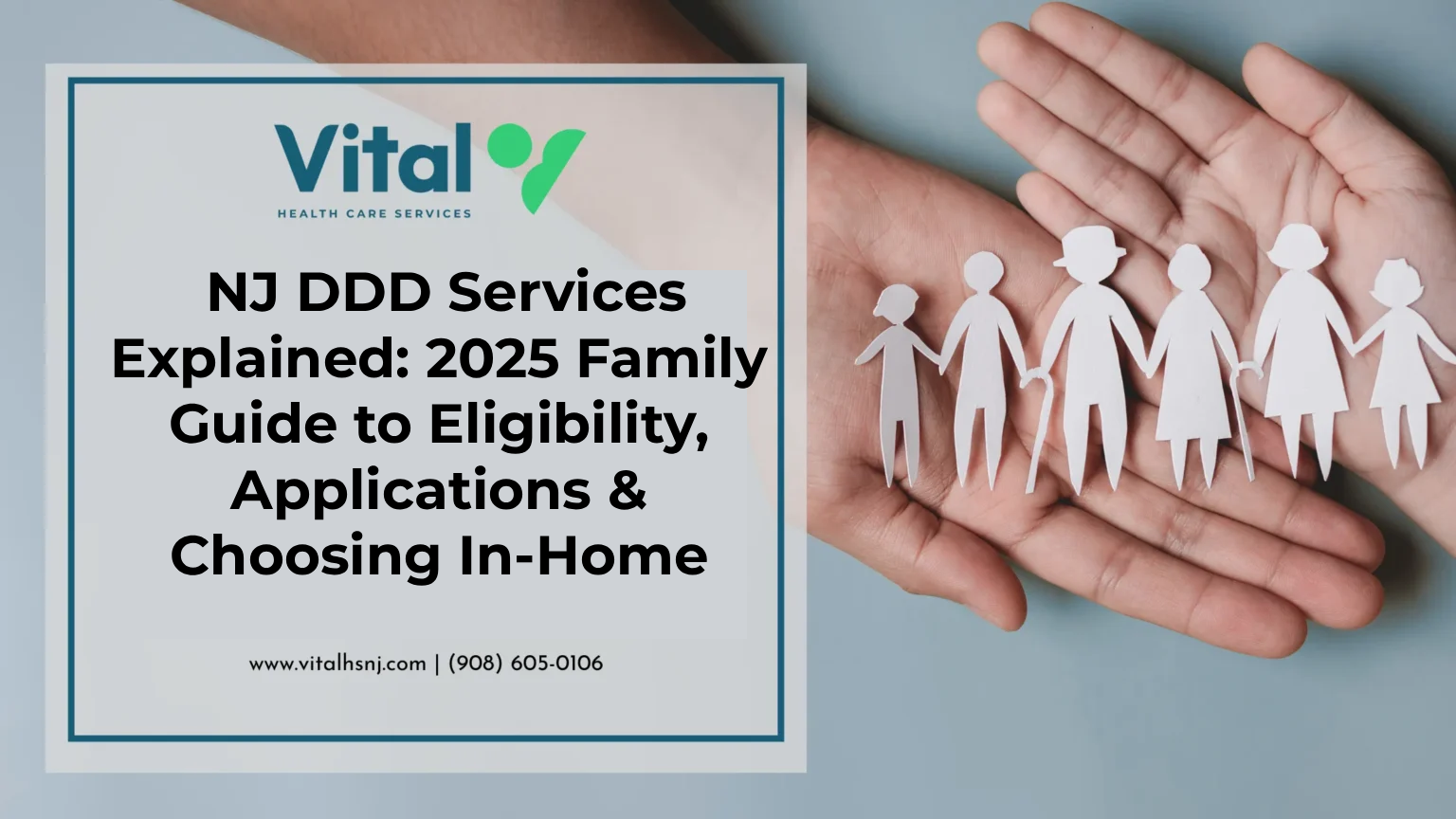When a loved one is living with developmental disabilities, families often turn to the New Jersey Division of Developmental Disabilities (DDD) for support. But if you have ever tried to figure out eligibility, paperwork, or how in-home support actually works, you already know the process can be overwhelming. This 2025 family guide is here to give you clarity and direction, especially if you live in Essex County or anywhere in the Greater NJ region.
What Is the New Jersey Division of Developmental Disabilities (DDD)?
The New Jersey Division of Developmental Disabilities exists to support people with lifelong developmental disabilities. It does this by providing access to programs, funding, and services that encourage independence and community living.
For families, this means opportunities for:
- Financial support to cover approved care needs
- Access to trained caregivers for in-home help
- Skill development programs for individuals with disabilities
- Community integration activities that build social confidence
On paper, the system looks straightforward. In reality, families often need a partner to help them understand it. That’s where Vital Health Services, based in Essex County, becomes essential.
Who Qualifies for DDD Services in 2025?
Not everyone automatically qualifies for services. The state requires families to meet certain criteria and provide clear documentation.
Basic Eligibility Requirements
- Disability diagnosed before age 22
- Proof that the condition causes substantial functional limitations
- New Jersey residency and U.S. citizenship
- Enrollment in Medicaid
Common Conditions Covered
- Autism spectrum disorder
- Cerebral palsy
- Down syndrome
- Epilepsy and seizure disorders
- Traumatic brain injuries with long-term impact
Functional Limitations the State Considers
- Self-care: Bathing, dressing, eating independently
- Mobility: Walking, using transportation safely
- Communication: Understanding and expressing information
- Learning and problem-solving: Managing new situations
- Independent living: Handling daily activities like money management
A family in Newark recently explained that what finally made their application successful was attaching not just medical records but also school Individualized Education Program (IEP) documents and speech therapy notes. The state looks for evidence across different areas of life.
How the 2025 DDD Application Process Works
Even with improvements, the application process can feel like a second full-time job for parents. Here is how it usually unfolds in 2025:
- Initial Screening – Families submit a request online or by calling the state’s intake line.
- Documentation Gathering – This step takes the longest. Families collect medical evaluations, psychological assessments, and educational records.
- Formal Application – Submitted through the NJ Department of Human Services online portal or mailed in.
- Assessment Review – A DDD case manager looks over the paperwork and may request further testing.
- Approval and Planning – Once eligibility is confirmed, the family meets with a support coordinator to decide which programs and services to use.
Families often ask about timelines. In practice, approval can take several weeks to several months. The most common reason for delay is incomplete paperwork. Partnering with a provider like Vital Health Services can make the process smoother by helping families stay organized.
Understanding DDD Support Programs
The Division of Developmental Disabilities offers two main funding streams:
- Supports Program: For individuals who live at home with family members. This includes most in-home disability support services.
- Community Care Program: For individuals who need more intensive or residential-level care.
Most families in Greater, NJ fall into the Supports Program category, which makes choosing the right in-home provider even more important.
Why Families Prefer In-Home DDD Support
In-home care keeps loved ones in familiar surroundings while still receiving the professional help they need. At Vital Health Services, our Care for the Developmentally Disabled program is built around this idea.
Our In-Home Services Include
- Daily living assistance (meals, grooming, mobility)
- Skill-building for independence (communication, problem-solving, routines)
- Social opportunities to prevent isolation
- Respite hours for parents and siblings
One Essex County family shared that after starting with Vital Health Services, their teenage son not only gained independence in dressing and grooming but also joined a local recreation program with the support of his caregiver. This kind of outcome is exactly what in-home support is designed to achieve.
Local Expertise Matters
Our agency is based in Essex County, but our reach extends across the entire Greater NJ region. Families in Montclair, Newark, Livingston, and nearby towns rely on us for consistent care and a deep understanding of local resources. National organizations may provide information, but local providers like Vital Health Services know the community programs, school systems, and case managers who make the process less intimidating.
Related Services That Work Together
Many families don’t stop at one program. They combine DDD support with other services to build a stronger safety net. Explore:
- Private Duty Nursing for skilled medical support
- Personal Care for everyday assistance
- Memory Care for seniors with dementia
Together, these services help families create complete, reliable care plans.
FAQs About New Jersey DDD Services
Q1: How long does approval usually take?
Approval times vary. Some families get approved in 6–8 weeks, while others wait longer, depending on documentation.
Q2: Do families choose their in-home provider?
Yes. Families are not assigned providers. You can select an agency like Vital Health Services to deliver care that matches your loved one’s needs.
Q3: What is the difference between the Supports and Community Care Programs?
Supports Program helps people living at home, while Community Care is for individuals who need full-time residential support.
Q4: What training do caregivers have?
Caregivers are trained in disability support, daily living assistance, and safety protocols, and many receive ongoing education to stay updated.
Q5: Are costs fully covered?
Most core services are funded through Medicaid and DDD programs. Families may need to contribute to additional services not included in the plan.
📞 Call Vital Health Services Today
Applying for help through the New Jersey Division of Developmental Disabilities (DDD) can feel like too much to handle alone. You don’t have to. Call (908) 605-0106 today and let Vital Health Services guide your family through eligibility, applications, and in-home support in Greater, NJ.
👉 Visit our Facebook page to connect with us and learn how other families in your community are navigating care.

